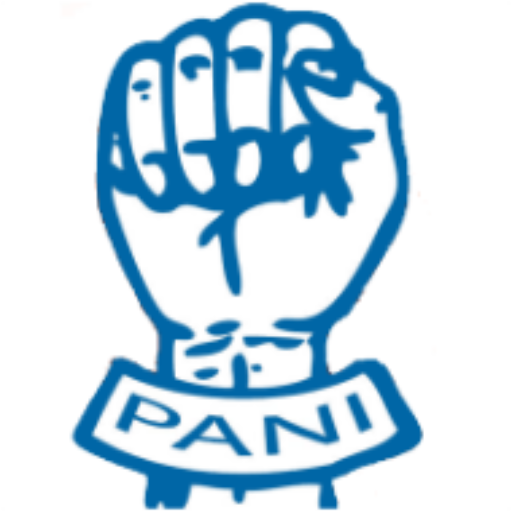Spandan
PANI Newsletter Jan-Mar 2025
As we step into another quarter, the echoes of transformation resonate across villages, fields and community spaces where PANI continues its journey of impact. From strengthening water conservation efforts to empowering adolescent girls and celebrating the spirit of resilience on International Women’s Day, this quarter has been full of energy and is a reflection of our collective vision for change. As we share these stories, we invite you to reflect, engage and be part of this movement towards a more equitable and sustainable future.
Reaffirming Commitment, Embracing the Future
On the eve of the New Year, PANI’s Chief Functionary addressed the team with a heartfelt video message, setting the tone for 2025 with a vision of renewed commitment and transformative action. Reflecting on PANI’s 38-year journey, he highlighted PANI’s unwavering dedication to sustainable development, gender equity and community empowerment.
Emphasizing the power of collective effort, he urged the team to embrace innovation to enhance education, healthcare and sustainability. “Every action we take contributes to a future where every girl can dream, every farmer is valued and every individual has the opportunity to thrive”, he affirmed.
His message was not only a reflection but a call to action: A reminder that PANI is more than an organization; it is a movement. With this renewed sense of purpose, the team steps into 2025 with determination, ready to create lasting impact.
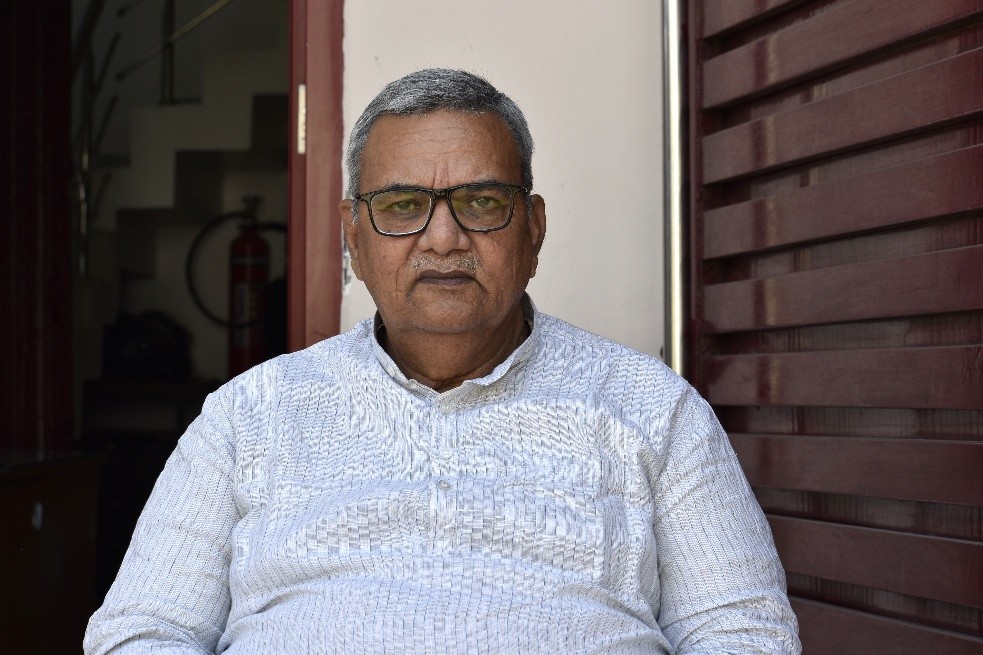
Bharat Bhushan, Founder Secretary, PANI
Partnerships and Collaborations
A Strong Foundation for Every Child: PANI at the Sewa, Suraksha and Sushasan Fair

Honourable Governor, Uttar Pradesh, Smt. Anandiben Patel Understood about Project
PANI at the India Fundraising Conference: Strengthening Networks and Amplifying Impact
In early February, PANI participated in the India Fundraising Conference, a thoughtfully curated platform bringing together changemakers, fundraising experts, and social sector leaders. Over two insightful days, our team engaged in masterclasses and discussions on critical themes – digital fundraising, ethical storytelling, data-driven donor engagement and the evolving landscape of philanthropy.
The sessions on crafting compelling narratives, leveraging social media and building resilient fundraising strategies provided invaluable takeaways. PANI’s team explored new approaches to donor outreach, deepened its understanding of sustainable funding models, and connected with peers working towards a shared vision of social transformation.
Beyond the technical learning, the conference reaffirmed the power of collaboration in the development sector. Exchanging ideas with fellow practitioners underscored the importance of authenticity, transparency and trust in fundraising – principles that resonate deeply with PANI’s ethos. As we integrate these insights into our work, we remain committed to strengthening our outreach, ensuring long-term sustainability of our work and amplifying our impact in the communities we work with.
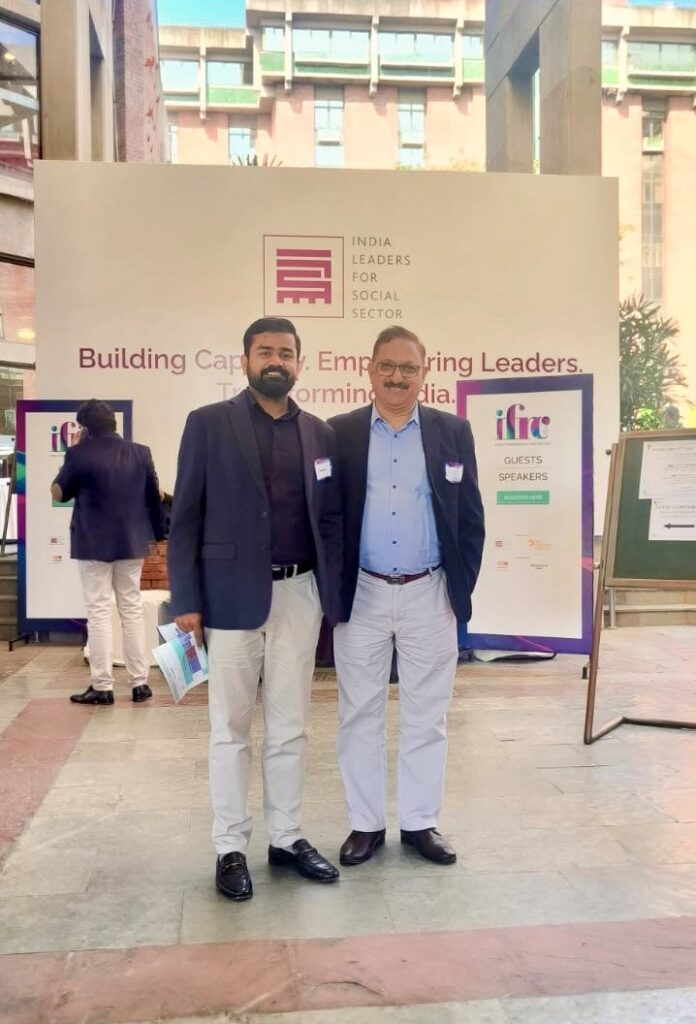
PANI at India Fund Raising Conference 2025
Bridging Local Realities with Global Conversations: PANI at PSPC2025
In March this year, a new journey unfolded – one that carried with it the lived experiences of rural Uttar Pradesh to the international stage in Bangkok. Representing PANI at the 15th Poverty and Social Protection Conference (PSPC2025), Mr. Deo Datt Singh shared a narrative often left at the margins: the quiet strength of rural communities navigating complex social protection systems and the profound shift that occurs when women and girls are supported to lead.
A paper co-authored by Sharvan Verma and Mr. Singh, “Reimagining Social Protection for Vulnerable Communities: Bridging Inequities and Nurturing Resilience for Inclusive and Sustainable Development in Uttar Pradesh, India,” reflected a key learning from our decades of grassroots engagement – when social protection is informed by community wisdom and shaped by those it intends to serve, especially women and adolescent girls, it becomes not only more inclusive, but more effective.
The conference was not only a space for sharing – it was also one of dialogue, reflection and possibility. Among the many connections forged, our engagement with the School of Agricultural Technology at King Mongkut’s Institute of Technology Ladkrabang (KMITL) stood out as a meaningful step forward. What began as a discussion grounded in mutual respect quickly evolved into the foundation of a promising academic and knowledge exchange partnership.
Together, PANI and KMITL are exploring avenues for student and faculty exchanges, collaborative research and intercultural learning – all rooted in a shared vision of sustainable development. These collaborations are more than formal agreements; they are opportunities to integrate diverse insights, deepen our understanding and enrich our approach to strengthening rural systems.
For an organization like PANI, grounded in the realities of village life, partnerships like these offer a chance to grow thoughtfully. They bring academic rigor to grassroots innovation, enable cross-border learning, and help refine our interventions in ways that are both context-sensitive and future-ready.
As we look ahead, we remain committed to nurturing this collaboration with KMITL and to cultivating global relationships that help build resilient and inclusive communities where local leadership is honoured, and global wisdom is welcomed.
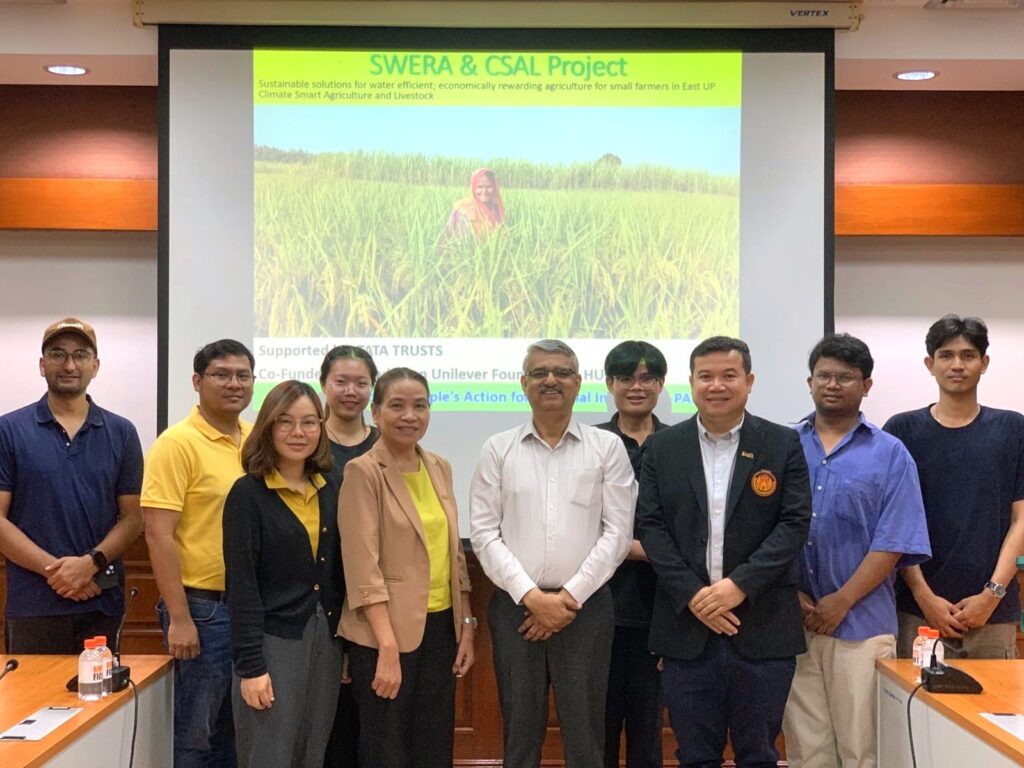
Mr Deo Datt Singh with students at KMITL
Awards & Recognitions
PANI Receives FICCI Water Award: Honouring Collective Commitment to Water Stewardship
In a moment of deep pride and affirmation, PANI was awarded First Prize in the “Water Initiative by NGOs” category at the 12th FICCI Water Awards 2024. The award, presented by Shri Amitabh Kant, India’s G20 Sherpa and former CEO of NITI Aayog, to Mr. Deo Datt Singh, our Director of Operations, recognized PANI’s sustained efforts in water conservation and sustainable agriculture rooted in grassroots leadership and collective responsibility.
This recognition is not only a milestone, it is also a mirror reflecting the strength of a movement that began with small steps in remote fields and has now touched over one lakh small and marginal women farmers across 300 Gram Panchayats in Balrampur, Uttar Pradesh. At its core are the strengths and dedication of our Community Resource Persons (CRPs), local women agricultural professionals trained to equip fellow farmers with water-efficient practices, better soil health strategies and climate-resilient methods. Together, these women have helped save an extraordinary 324 billion litres of water, all while cultivating resilience and dignity in their communities.
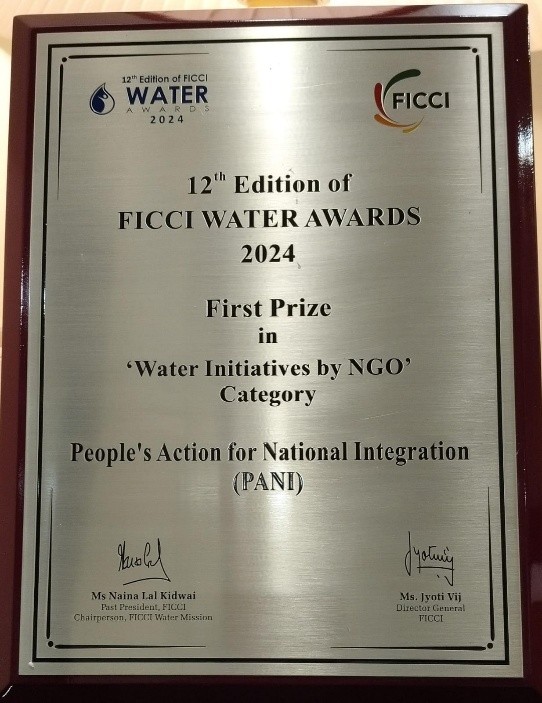
FICCI Water Award to PANI
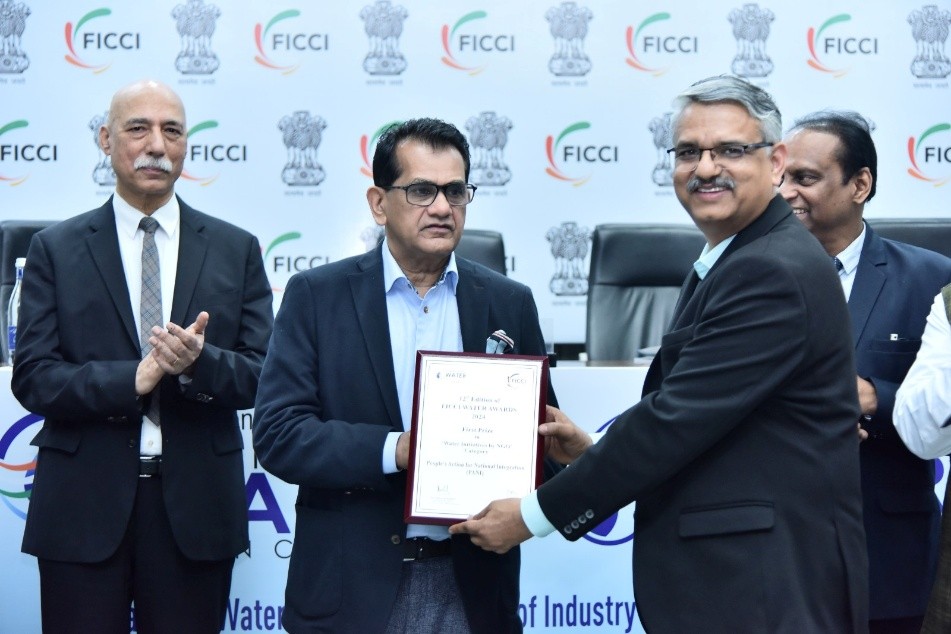
PANI’s Deo Datt Singh being Awarded the First Prize
During the 10th India Industry Water Conclave, where the award was conferred, Mr. Deo Datt Singh powerfully articulated the essence of our work – “Water security cannot be achieved in silos. We need a collective and concerted effort to drive real change.” His words echoed throughout the conclave, resonating with the larger truth that water is not merely a resource but a shared social and ecological trust. True stewardship, therefore, must transcend institutional boundaries and be anchored in collaboration between communities, civil society, government and businesses.
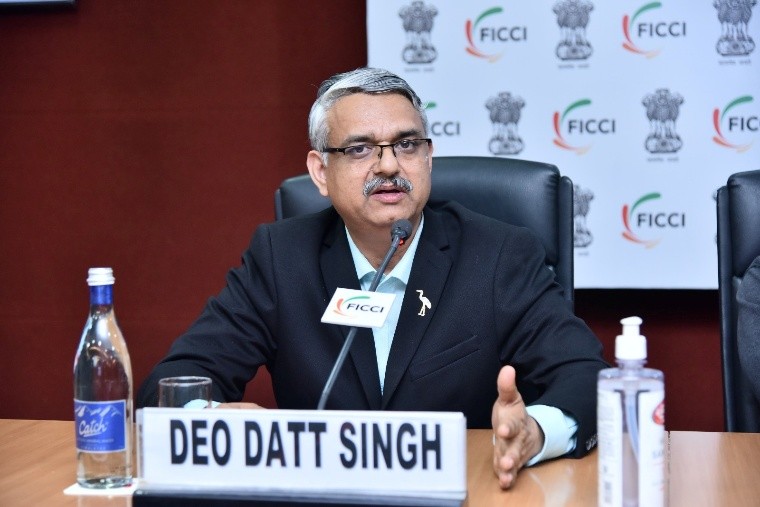
PANI’s Deo Datt Singh speaking at the 10th India Industry Water Conclave
This quarter, as we reflect on this recognition, we do so with humility and a renewed sense of purpose. The award belongs not only to PANI but to every woman farmer who chose to adopt a new practice, to every CRP who walked from field to field to bring change, and to every voice that believes in the power of community-led action.
Going forward, we remain steadfast in strengthening the CRP movement and nurturing local leadership, especially among women, to ensure that water-secure, climate-resilient communities are not just imagined, but realised.
Brief message from our Chief Functionary on actions on the long-term water sustainability plan:
(As Published in the “Compendium of Best Practices” launched at the event “12th Edition of FICCI Water Awards 2024” Read Here Page 72:)
At PANI, our philosophy with regards to water begins with our vision which states: PANI envisions itself as a medium for building an inclusive society that prospers in harmony with its surroundings. Living in harmony with our surrounding does not just entails the social, but also natural surroundings. All our life lessons began with a simple yet profound truth: Jal Hi Jeevan Hai – Water is Life. This timeless wisdom reflects the essence of our relationship with water, one that runs deeper than mere utility. Water is not just a resource, it is the lifeblood of the ecosystems we share with every form of life – plants, animals, microorganisms. For humans, water connects us not only to our needs but to our role as caretakers of nature.
Our vision is anchored in this balance. PANI is committed to nurturing a harmonious relationship between humans and nature, where water is conserved, purified, and respected. This ethos has guided our work since the beginning, with nearly one-third of our projects focused on Natural Resource Management and Climate Change. But we know that the efforts cannot be fleeting. Our long-term sustainability plan emphasizes continuity and scale – ensuring that our work does not stop with one-off initiatives, but grows through partnerships and collaborations.
The actions we take are about empowering communities, particularly at the grassroots level. We have mobilized Community Resource Persons (CRPs) – primarily women and adolescent girls – who play a pivotal role in water conservation, promoting sustainable and efficient water usage in both domestic and agricultural contexts. These efforts are magnified through our partnerships with peer organizations in the SATHI Network (Supporting Association for Thematic and Holistic Initiatives), where we share knowledge and encourage collective action across hundreds of Civil Society Organizations.
Our approach is holistic. We believe water conservation should be integrated into every facet of life. Through programs like the Chachikpur Rural Change – Makers Program, we train future leaders on the essentials of water-saving practices, connecting the importance of water to everything from food sustainability to ecosystem health. These are not just isolated lessons; they are building blocks for a future where water conservation is woven into the fabric of everyday life.
Ultimately, PANI is not just about water – it’s about harmony. Our long-term water sustainability plan is a journey of reconnection, helping society realize that we are not separate from nature but an integral part of it. Water gives life, and our role is to ensure that it continues to sustain all life, now and for generations to come.
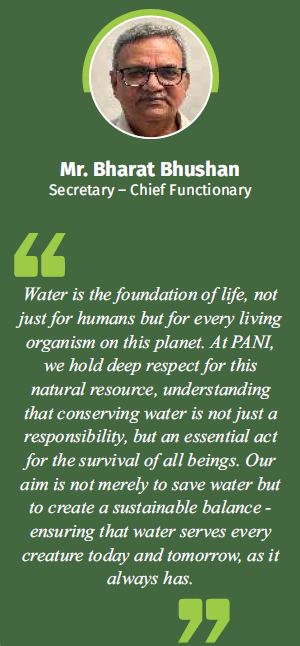
Strengthening Capabilities
“The Story Lives in Us”: Storytelling Workshop at PANI
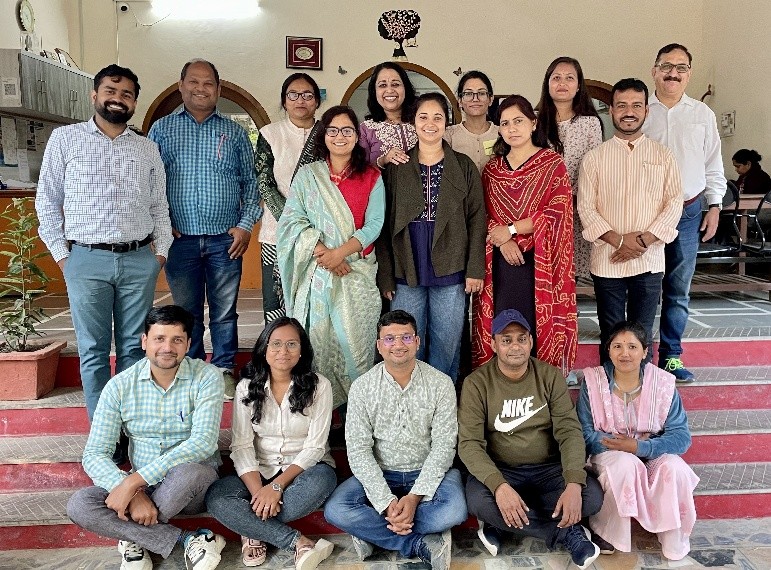
The Storytellers’ Lab
At PANI, stories have always been present, in field notes, community meetings, in laughter shared during trainings and in the quiet actions that follow breakthroughs. But over time, as programs grew and responsibilities expanded, so did the need to pause and reflect: Were we truly capturing the depth of the change we were witnessing?
It was with this question in mind that The Storytellers’ Lab was envisioned, not as a standalone training, but as the first step toward building a deeper culture of storytelling within the organisation. A culture where stories are not just tools for communication, but ways of thinking, feeling and staying connected to purpose.
On the first day of the Lab, after foundational sessions on personal narratives and storytelling techniques, the workshop slowed down and shifted focus. Participants gathered to watch a series of videos showcasing India’s rich storytelling traditions, not from textbooks or conference halls, but from the lived art of folk performers, street artists, puppeteers, scroll painters and musicians.
These videos did not “teach” storytelling, they allowed us to remember it. To witness how stories have always been embedded in the everyday: in a hand gesture, a ritual, a melody, a painted motif. These were not performances for applause, but practices of preservation. They carried history, humour, justice, longing and belonging.
In the quiet that followed the screenings, something important settled in the room. For many participants, this was the first time storytelling was introduced not as a professional tool, but as a shared inheritance. Something we already know something we have experienced in childhood, in festivals, in conversations with elders but perhaps had not named or claimed as our own.
It became clear that storytelling at PANI would not begin from templates or structures alone. It would begin from where we already are – from memory, culture and lived experience. From noticing how we describe a farmer’s resilience, how we hold a young girl’s determination in language, how we honour the quiet victories in our work.
The important story elements introduced earlier in the workshop, the 4Cs, 4Es, 4Ps*, suddenly felt familiar. Not new ideas, but names for patterns we have already carried within us. And in that recognition, the pressure shifted. Storytelling no longer felt like a skill to master, but a space to return to with intention.
As PANI moves forward in embedding storytelling more deliberately into its internal and external communications, this session marked a turning point. It offered not just knowledge, but grounding. Not just inspiration, but alignment with who we are, where we come from and how we choose to tell the stories that matter.
- *4Cs – Context, Conflict, Climax, Closure
- *4Es – Emotion, Empathy, Experience, Engagement
- *4Ps – Purpose, Plot, People, Place
Celebrations
PANI Celebrates World Wetlands Day: Honouring Nature’s Lifelines
On World Wetlands Day, PANI reaffirmed its commitment to preserving these vital ecosystems that sustain biodiversity, support livelihoods and regulate climate. Through a series of interactive sessions, community engagements and awareness activities, the day was marked by a collective reflection on the indispensable role of wetlands in environmental and human well-being.
From discussions on water conservation to field visits that deepened community connections with local wetlands, the celebrations were not just events but people’s active participation in conserving this valuable natural resource. Participants – community members, experts and young changemakers – explored the intricate link between wetlands, agriculture and sustainable water management, emphasizing the urgency of conservation.
PANI’s work has long recognized that environmental stewardship is inseparable from social progress. By inculcating local ownership, strengthening traditional knowledge and promoting responsible water use, we continue to advocate for a future where wetlands are protected, restored and valued. This World Wetlands Day was not just about awareness – it was about reaffirming a shared responsibility to safeguard these ecosystems for generations to come.
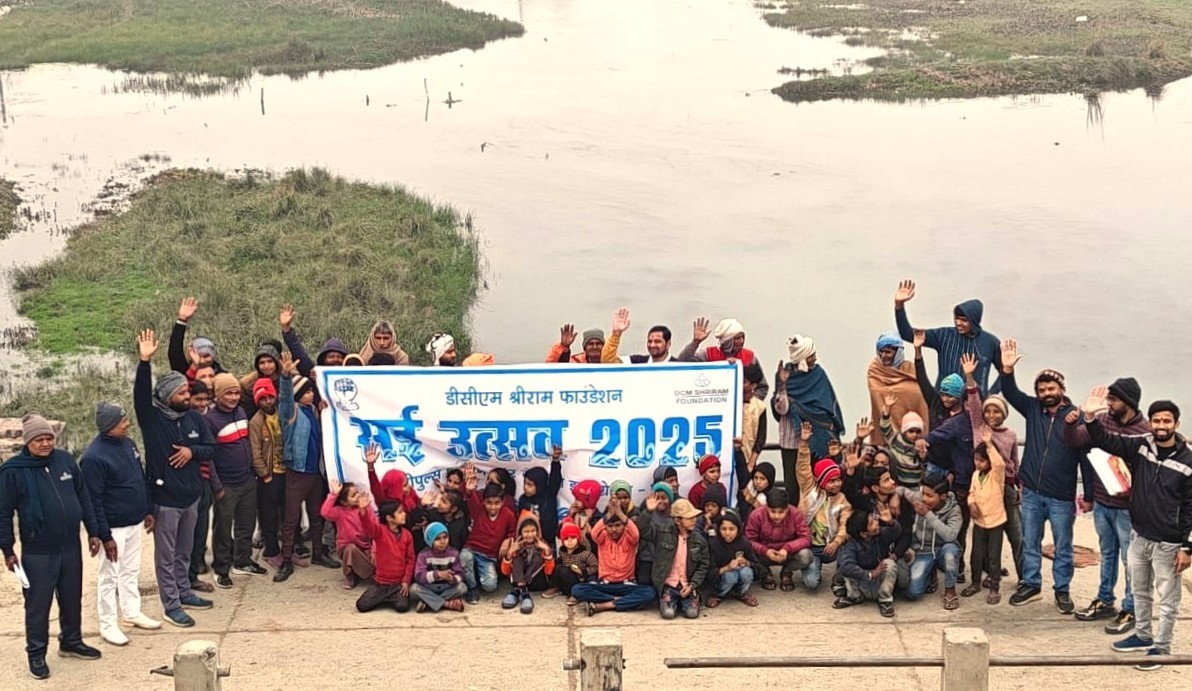
World Wetlands Day Celebrations by PANI team
‘The Space Was Always Hers’ – International Women’s Day at PANI
There was no single moment that defined International Women’s Day across PANI this year. Instead, there were many. A lamp lit quietly by a woman Gram Pradhan. A teenage girl stepping onto a stage she had once only watched from afar. A grandmother sitting front row, her eyes fixed on her granddaughter as she spoke boldly, clearly, as if the silence that once existed had never belonged there.
These moments, scattered across dozens of villages in Uttar Pradesh, were part of PANI’s celebration of International Women’s Day 2025, held under the theme: “Community Leadership and Action: Allyship, Empowerment, and Climate Justice.” Across Gram Panchayats in Siddharthnagar, Sultanpur, Ambedkar Nagar and more, our teams, adolescent girls, frontline workers, teachers and local leaders gathered not only to commemorate the day, but to embody it.
There were songs, dances, and role plays not only as performances but as declarations. Girls spoke of climate change, of leadership, of responsibility not as distant ideals, but as lived realities. They claimed space on stage, in conversations, in decision-making. And around them, something shifted. Families listened. Teachers nodded. Community members stood still, perhaps for the first time seeing the girls not as daughters or students, but as voices in their own right.
What made these celebrations powerful was not only scale, it was also sincerity. The insistence that leadership does not always look like a podium or a title. Sometimes, it looks like a girl saying, “I want more,” and a community answering, “We will walk with you.”
The theme of climate justice ran through the events as a shared concern. Girls and women connected their everyday lives with the changing environment – drying ponds, unpredictable rains, soil that no longer held moisture like it once did. And they offered answers as stewards of a different path forward.
At PANI, we have long believed that empowerment is not something delivered. It is discovered. Often quietly. Sometimes defiantly. But always with great courage. This International Women’s Day, we did not just celebrate women and girls. We listened to them. We stood with them. And most importantly, we watched them stand on their own. Because the truth is: the space was always hers. She is just now beginning to take it.
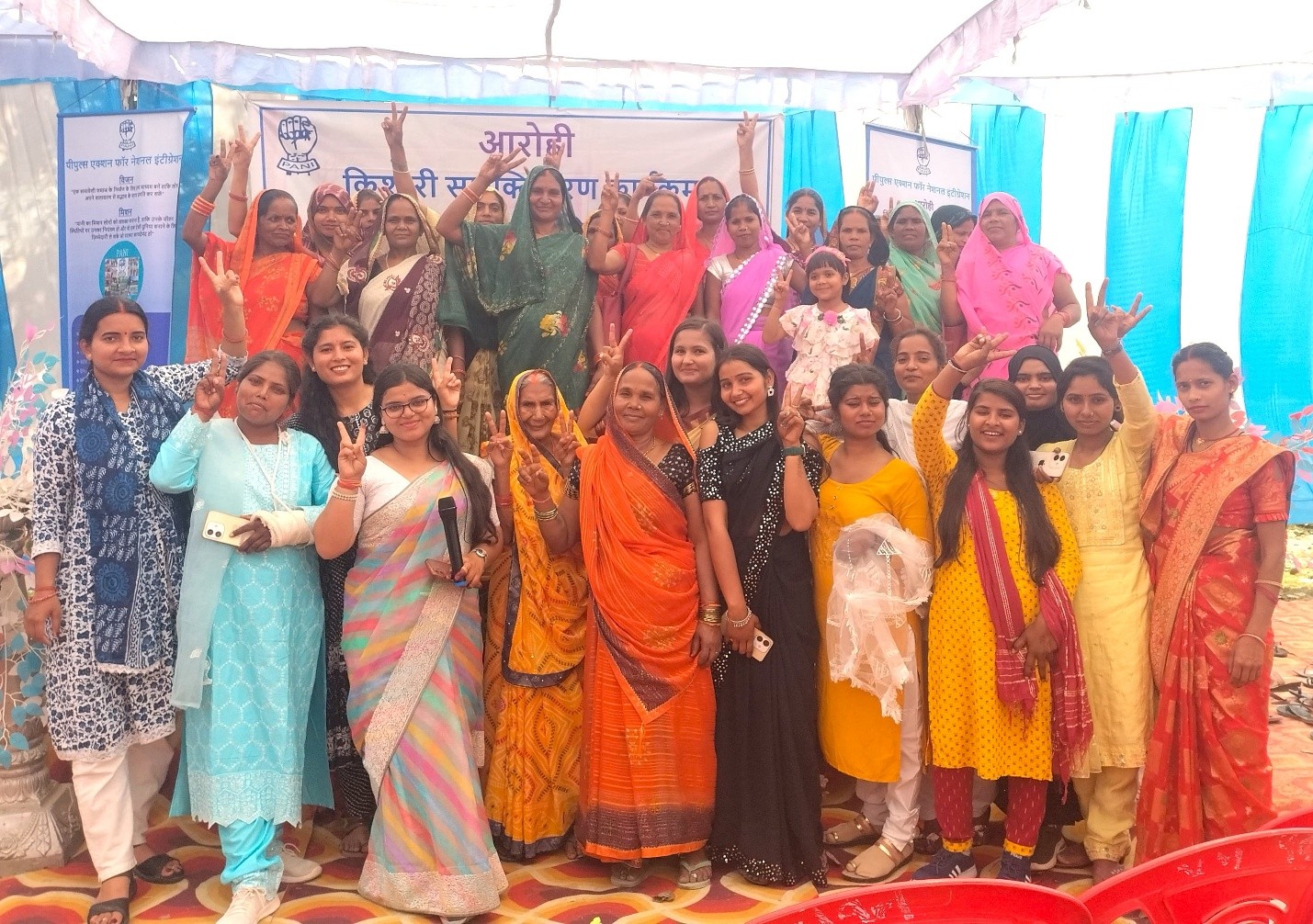
International Women’s Day Celebrations at PANI
World Water Day celebrations at PANI
This March, as the world observed World Water Day, PANI’s teams across Uttar Pradesh turned reflection into action – reaffirming a truth that has long guided our work: water is not only a resource, it is a relationship. A relationship between land and life, community and care, present need and future responsibility.
Across six districts, from Balrampur to Gonda, our teams joined hands with women farmers, schoolchildren, frontline workers and local leaders to mark the day with grounded action and meaningful dialogue. These activities were moments of reaffirmation of how deeply our communities understand the role of water in shaping their daily lives and of how far they have come in reimagining their relationship with it.
At the core of this effort were 500 trained Community Resource Persons (CRPs) and over 2.5 lakh women farmers, who are leading the shift toward water-wise agriculture. These are women who were once on the margins of agricultural decisions have now saved 510 billion litres of water – through consistent, localised practices like mulching, zero tillage, water budgeting and intercropping. Practices that honour the soil, respect the seasons and speak to a kind of stewardship that is as quiet as it is powerful.
This year’s celebration was also deeply intertwined with the International Day of Forests, reminding us that water cannot be secured in isolation. In Gonda, over 200 farmers, youth leaders and government officials rallied together, planting saplings in Amrit Park and pledging to restore the link between healthy forests, fertile soil and flowing water. The presence of the District Magistrate underscored a shared commitment – governance and grassroots aligning for environmental resilience.
In villages and schools, children painted their hopes for a water-secure future. Women’s collectives revived local ponds and pushed conversations on household water use. In community meetings, ancestral knowledge about rainwater harvesting and soil protection found space again – brought to life through stories, discussions and shared purpose.
These stories of action found their way into local media, amplifying the voices of communities who are no longer passive recipients of aid but active designers of resilience. At PANI, we know that water resilience is not built in a day. But we also know that every saved litre, every changed practice, every conversation matters. World Water Day was not a one-off event. It was part of a longer journey led by those who live closest to the land, who know its pulse and who are shaping a future where water, and those who protect it, are valued above all.
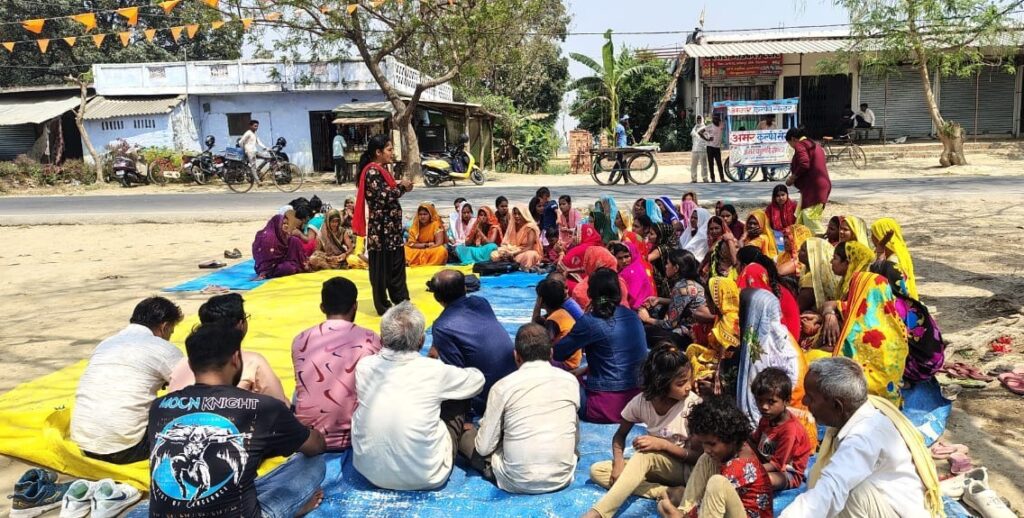
World Water Day discussions with communities
Living the Spirit of Democracy: Republic Day at PANI
On January 26th, as the tricolour unfurled, PANI’s teams across different locations came together – not just to celebrate the day but to reaffirm the values that guide both our nation and our work. True democracy is not just about governance; it is about ensuring that every individual, regardless of background, lives with dignity, fairness and equal opportunity. At PANI, this spirit of Ganatantra is woven into everything we do – whether it is empowering the marginalized to reclaim their rights, ensuring that social and economic gaps do not dictate one’s future, or nurturing leadership where it was overlooked.
Inspired by Gandhian principles, integrity has been the foundation of our work – walking the path of truth, ethical action and unwavering commitment to service. Equity is not just an ideal but a responsibility, ensuring that the most vulnerable are not left behind. Transparency and accountability guide our every step, whether in community-led initiatives, governance structures, or our own internal systems, ensuring that trust remains at the heart of change. As Republic Day was marked with spirited celebrations, discussions and community engagements, it was a reminder that PANI’s true tribute to democracy lies in its daily efforts – where every action upholds justice, every voice matters and every step brings us closer to an equitable and empowered society. Jai Hind!
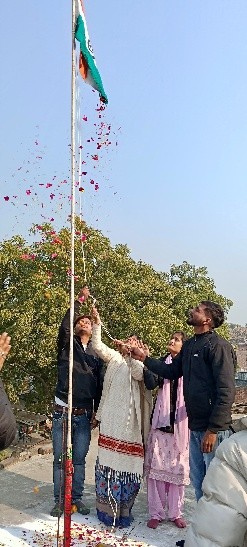
Republic Day at PANI

